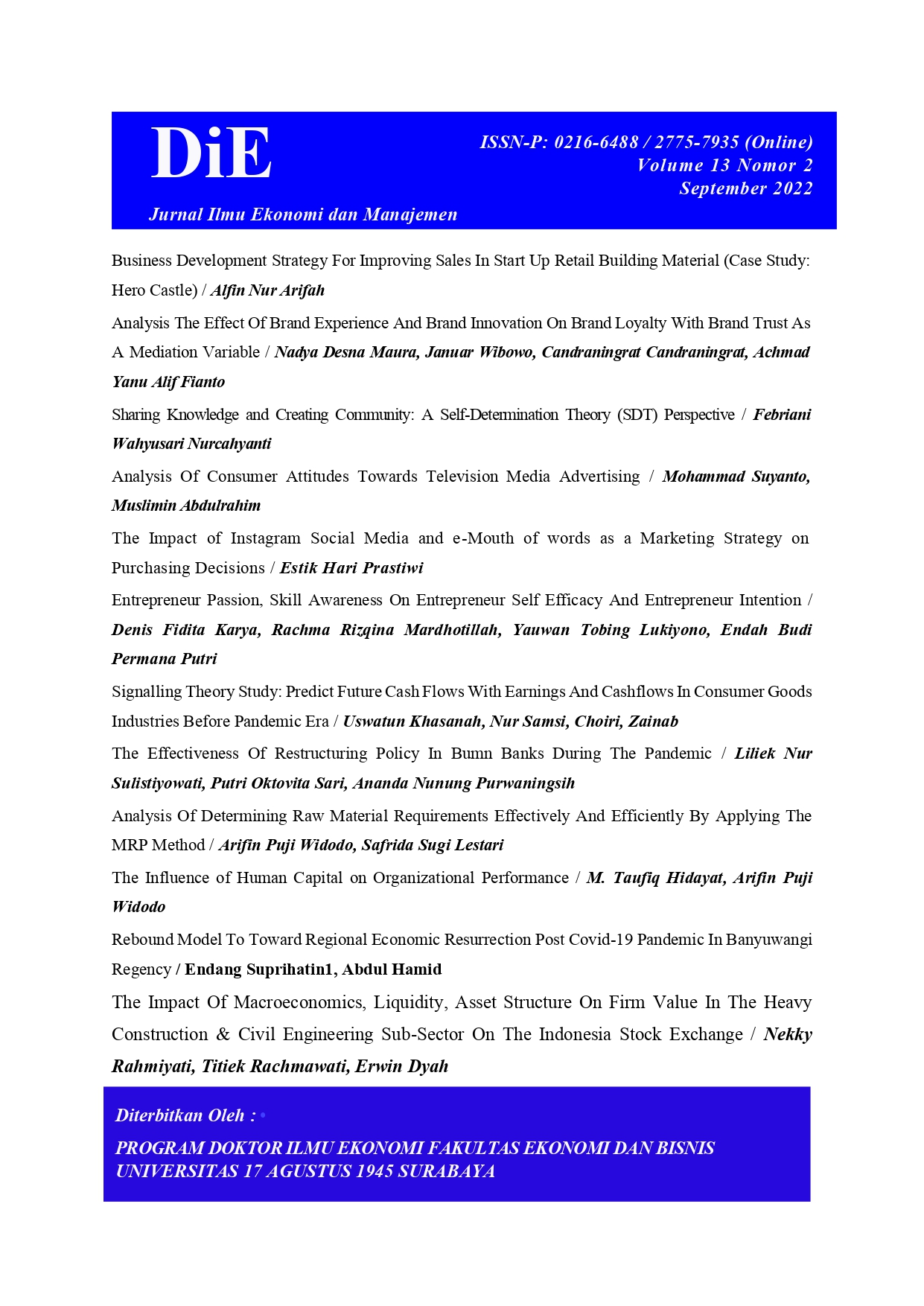Sharing Knowledge and Creating Community: A Self-Determination Theory (SDT) Perspective
DOI:
https://doi.org/10.30996/die.v13i2.7294Keywords:
Community, knowledge sharing, innovation and Self-Determination Theory (SDT)Abstract
This study was conducted to develop previous findings in the form of building communities with insignificant innovations that can be mediated by knowledge-sharing variables. The sample used in this study were 105 owners of Small and Medium Enterprises (SMEs) in Bantul Regency, Yogyakarta which was collected through research questionnaires. The research method used is the quantitative method. Data were collected and analyzed using PLS. The results of the study indicate that the concept of knowledge sharing can increase the innovation of SMEs. With the view of the theory of Self-Determination Theory (SDT) means the illustrated model for self-determination motivation. SDT describes the externally controlled motivators provided by the organization, described resources which include assets, capital, finance, human resources, and so on.
Downloads
References
Alatas, Syed Hussein. The Sociology of Corruption. Ed. 2. Singapore: Delta Orient Pte. Ltd, 1999.
Ali, Chaidir. Badan Hukum. Bandung, 1987.
Asikin, Zaenal. Pokok-Pokok Hukum Perbankan Di Indonesia. II. Jakarta: Raja Grafindo Persada, 1997.
C.S.T. Kansil, Christine. Pokok-Pokok Pengetahuan Hukum Dagang Indonesia. Jakarta, 2013.
Dirjosisworo, Soedjono. Hukum Perusahaan Mengenai Bentuk-Bentuk Perusahaan (Badan Usaha) Di Indonesia. Bandung: Mandar Maju, 1997.
Djumhana, Muhammad. Rahasia Bank (Ketentuan Dan Penerapannya) Di Indonesia. Bandung: PT. Citra Aditya Bakti, 1996.
Harahap, M. Yahya. Hukum Perseroan Terbatas. Sinar Grafika, 2009.
Hartono, Sri Redjeki. Bentuk-Bentuk Kerjasama Dalam Dunia Niaga. Semarang, 1985.
Imannsyah,Addy,2011.Perlindungan Negara terhadap Kebebasan Beragama DiIndonesia (Studi Kasus Surat Keputusan Gubernur Jawa Timur No.188/94/KPTS/013/2011 Tentang Larangan Aktivitas Jemaat Ahmadiyah Indonesia (JAI)di Jawa Timur), Tesis, Fakultas Hukum Universitas Airlangga, Surabaya.
Kasmir. Dasar-Dasar Perbankan. Jakarta: PT. Raja Grafindo Persada, 2008.
Khakim, Abdul. Dasar-Dasar Hukum Ketenagakerjaan Indonesia. Bandung: PT. Citra Aditya Bakti, 2014.
Kusumaatmadja, Mochtar, and B. Arief Sidharta. Pengantar Ilmu Hukum, Suatu Pengenalan Pertama Berlakunya Ruang Lingkup Berlakunya Ilmu Hukum. Buku I. Bandung, 2000.
Kasim, Ifdhal, 2011. “hak sipil dan politik: esai-esai pilihan”, lembaga studi dan advokasi masyarakat (ELSM),jakarta.
Khanif, Al,2010. Hukum & Kebebasan Beragama di Indonesia, LaksBang Mediatama, Yogyakarta.
Komnas HAM, 2016.”Upaya Negara Menjamin Hak-Hak Kelompok Minoritas di Indonesia”,Sebuah Laporan Awal, Jakarta.
Mulia,SitiMusdah,makalahyangdisampaikanpadaacaraKonsultasiPublikuntukAdvokasiterhadapRUUKUHPdiselenggarakanolehAliansiNasionalReformasiKUHP,tanggal 4Juli 2007 di Jakarta.
Manulang, Sedjun H. Pokok-Pokok Ketenagakerjaan. Jakarta: Rineka Cipta, 1987.
Muladi. Pertanggungjawaban Pidana Korporasi Dalam Kerangka Lingkungan Hukum Bisnis. Surabaya, 2010.
M. Sri Soemantri,1987. Prosedur dan Sistem Perubahan Konstitusi,Alumni Bandung.
Nowak, Manfred,2003.Pengantar pada Rezim HAM Internasional, terjemahan oleh Sri Sulastini, Jakarta: Departemen Hukum dan HAM Indonesia.
Rhona,K.M.Smith,dkk,2008.HukumHakAsasi Manusia,PUSHAM UII,Yogyakarta.
Rithi, Hyronimus,2011.Filsafat Hukum, Universitas Atma Jaya, Yogyakarta.
Sihombing,UliParulian,2008.MenggugatBakorPakem:KajianHukumTerhadap PengawasanAgamadanKepercayaandiIndonesia,ILRC,Jakarta.
Syafi’ie, M.,2012.ToFulfillandToProtect:MembacaKasus-KasusAktualtentangHakAsasi Manusia, PUSHAM UII, Yogyakarta.
Tenrisangka, Alifah Pratisara,2017.Perlindungan Penganut Kepercayaan Di Indonesia, Universitas Airlangga, Surabaya.
Twiss, Summer B.danJohn Kelsay,2007.Agama dan Hak-Hak Asasi Manusia, Institut DIAN, Yogyakarta.
Utomo,Fajar Satrio, Perlindungan Hukum Bagi Jemaat Ahmadiyah, Univesritas Airlangga, Surabaya.
Update Indonesia — Volume XI, No. 9 – November 2017.
Downloads
Published
Issue
Section
License
The author who will publish the manuscript at DiE: Jurnal Ilmu Ekonomi dan Manajemen, agree to the following terms:
1. Authors retain copyright and grant the journal right of first publication with the work simultaneously licensed under a Creative Commons Attribution ShareAlike License that allows others to share the work with an acknowledgment of the work's authorship and initial publication in this journal.
2. Authors are able to enter into separate, additional contractual arrangements for the non-exclusive distribution of the journal's published version of the work (e.g., post it to an institutional repository or publish it in a book), with an acknowledgment of its initial publication in this journal.
3. Authors are permitted and encouraged to post their work online (e.g., in institutional repositories, pre-prints sites or on their website) prior to and during the submission process, as it can lead to productive exchanges, as well as earlier and greater dissemination of published work








